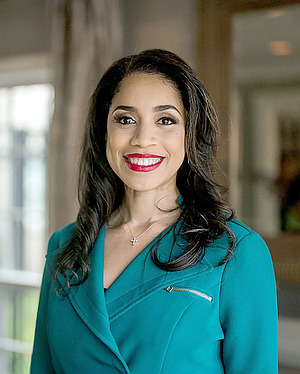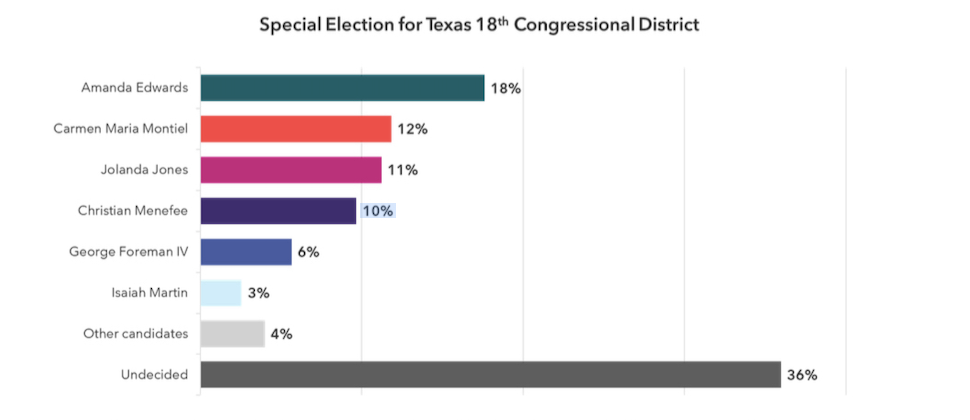8/12/2025

Former Houston City Council Member Amanda Edwards leads the Democratic field in the special election for Texas’ 18th Congressional District, according to a poll by Brilliant Corners Research & Strategies. The survey, conducted July 20–23 among 500 likely voters, shows Edwards ahead of fellow Democrats Jolanda Jones, Christian Menefee, and Isaiah Martin, with 36% of respondents still undecided.
The 18th District centers on inner-city Houston and surrounding neighborhoods and has been represented historically by prominent Democrats, including Barbara Jordan in the 1970s and, for many years, Sheila Jackson Lee, who routinely won re-election by wide margins. Those long Democratic margins reflect the district’s urban composition and its electorate’s voting patterns in statewide and presidential contests.
 Source: Brilliant Corners Research & Strategies poll, conducted July 20–23.
Source: Brilliant Corners Research & Strategies poll, conducted July 20–23.
The district is largely urban and diverse. Census and other data sources put the district’s population near 770–790,000 people, with a median age in the low 30s and a median household income in the roughly $59,000–$61,000 range. Racial and ethnic composition has a substantial Hispanic population alongside a large Black population, and smaller shares of White and Asian residents; these demographics have shaped the district’s policy priorities and political coalitions. The Cook Partisan Voting Index in recent measures rates the district as strongly Democratic (around D+20 range), a reflection of its consistent support for Democratic presidential and statewide candidates.
Hstorically, Democratic nominees in TX-18 have carried the district by comfortable margins in general elections, and Democratic primary winners — including Jackson Lee in recent cycles — have often faced little difficulty in general election contests. Those margins are the product of both turnout patterns in city precincts and the way district lines have been drawn over time to include dense, Democratic-leaning neighborhoods. At the same time, special elections present different dynamics than regular election cycles: turnout is typically lower and more dependent on targeted outreach, voter mobilization, and name recognition, which can magnify the impact of early campaign organization and endorsements.
Brilliant Corners’ memo emphasizes that Edwards’ lead is statistically significant within the sample but also notes the very large undecided bloc. With a margin of error reported around ±4.4 percentage points, the undecided voters and late campaign activity could alter the final result; in special elections, ground game and rapid messaging shifts often rearrange early standings. Analysts and campaign operatives will likely focus on both persuasion and turning out supportive voters in the coming weeks.
The 18th District carries notable symbolic weight because of its association with figures such as Barbara Jordan and its history as a majority-minority, urban seat. Proposed or enacted redistricting plans at the state level have drawn attention from candidates and community groups because changes to district boundaries could affect the composition of the electorate — and therefore the competitiveness and representational dynamics of the race. Those concerns were raised publicly during recent state redistricting debates, making the special election a closely observed contest for local and state political observers.
"This data confirms what we've consistently heard from the community: a demand for leadership that is grounded in this community, who will fight for them and stand up to Donald Trump," said Amanda Edwards. "In this critical moment for our nation, when our freedoms, our healthcare, and Social Security and Medicare are under attack, voters want someone they can trust to fight for them in Washington. I have always shown up and delivered for our community. And I will do the same while in Congress. This community knows that I will always place people over politics."
Edwards, a former at-large Houston city council member and lawyer, has collected several high-profile endorsements from national and local organizations. Other Democratic contenders named in the poll included Jolanda Jones (11%) and Christian Menefee (10%), with independent and other candidates trailing. The presence of multiple Democrats in a crowded field — together with the sizable undecided vote — means that primary-style intraparty competition and vote splitting are factors to watch as the special election proceeds.
